-
Preventing Dental Emergencies: Tips and Tricks to Keep Your Teeth Safe

Man taking care of teeth to prevent dental emergencies.
Dental Emergencies Are a Problem
When you have a dental emergency, it’s more than just inconvenient, it’s also traumatic. Painful and stressful, accidents can lead to hours at the emergency dentist and, in some cases, permanent tooth loss or severe gum bleeding. While there’s no way to prevent accidents completely, there are a few steps you can take to avoid most dental emergencies.
Your Dentist is Your Ally
Regular dental visits can help keep your teeth healthy and strong, catching problems before they become emergencies. What’s more, your dentist can recommend measures like sealants to protect your teeth from decay or an oral appliance to guard against bruxism. See your dentist twice a year for preventive care and a cleaning. Being proactive about preventive dental care can be much less costly and stressful in the long run.
Tips for Keeping Your Teeth Safe
- Practice good dental hygiene. At home, brush twice a day, floss at least once, and use mouthwash. Keeping your teeth clean can help prevent cavities, gum disease, cracks, fractures, and infections. Having your teeth deep cleaned at the dentist’s office twice a year gives added protection.
- Eat a tooth-strengthening diet. Eat a nutrient-dense diet, taking care to eat foods like leafy greens, fresh fruits and vegetables, and calcium-rich foods. Limit consumption of processed foods and sugary sweets, which can cause plaque buildup and feed the bacteria that cause tooth decay.
- Protect your teeth during sports. If you participate in sports, talk to your dentist about getting a custom-made mouthguard. This can make a big difference in keeping your teeth from being knocked out or damaged. You might also want a mouthguard to wear at night, to prevent teeth grinding.
- Manage your stress. Stress is bad for your whole body, and it can damage your teeth. People who are stressed may absentmindedly chew on hard things, and stress can cause people to grind their teeth. Embrace techniques like mindfulness, practice yoga, or find other healthy ways to manage your stress.
- Remember that teeth are not tools. We’ve all used our teeth for something we shouldn’t from time to time, when we can’t find the scissors, or the bottle opener is in another room. It could be fine, but then on the other hand, it only takes once for a tooth to crack. The convenience of not having to rummage through a drawer or ask for help is not worth risking your teeth.
- Don’t hesitate to seek dental care. Don’t let a dental emergency get out of hand. If you have a toothache, seek treatment as quickly as possible. Pain is an indication that something is not right, and getting treatment quickly can mean the difference between a routine procedure and serious oral surgery.
Park 56 is Here for Your Emergencies
If you’re looking for a dentist in New York, why not choose the dentist voted best in the city? At Park 56 Dental Group, we offer pediatric, prosthodontics, endodontics, oral surgery, Invisalign®, emergency, and sedation dentistry, all at the highest level of treatment. We serve the Midtown, Central Park, Upper East Side, Park Avenue, and all surrounding Manhattan and New York areas, with a patient-centered practice that has hours to fit your schedule. Schedule your complimentary consultation today by contacting us online or calling us at (212) 826-2322.
-
Foods that Naturally Help Prevent Cavities
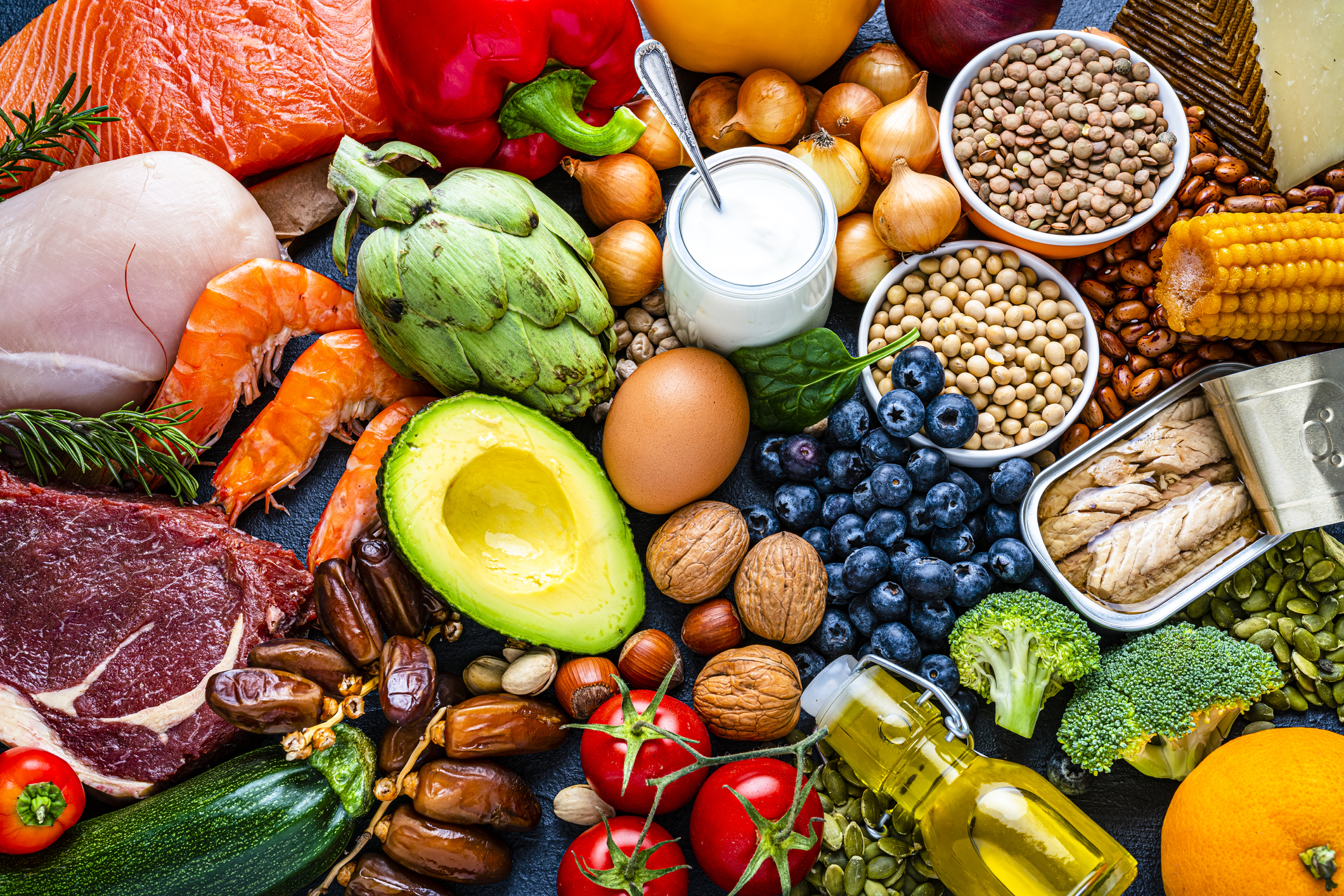
Healthy food for healthy teeth.
Avoiding Cavities
You have heard since childhood that eating too many sugary sweets will give you cavities. As an adult, you might even be aware that simple carbs, dried fruit, and acidic foods can all lead to the formation of cavities. What you may not know, though, is that you can be proactive in what you eat, and consume foods that actually prevent cavities instead of just avoiding foods. Read on- we’ve got the scoop on eating foods that are good for your teeth.
Healing Cavities
If you think about the human body, it’s pretty amazing, in the ways it heals itself. Our immune systems rush to repair damage caused by a wound or injury, which is remarkable. Did you know that the mouth can heal itself, too? Saliva helps remineralize your teeth and stop tooth decay in the early stages. However, as with other part of the body, the mouth’s healing process requires the support of the right vitamins and minerals. To heal cavities before they take hold, eat foods rich in the following nutrients:
- Calcium
- Vitamin D
- Vitamin K2
- Magnesium
- Phosphorus
- Xylitol
Understanding Cavities
Do you know how cavities form? It’s a complex process, and can take days, weeks, or even months. First, plaque forms when bacteria and food particles coat the surface of the tooth and are allowed to remain there. Plaque buildup increases as the plaque is fed by carbohydrates like sugars or bread, and as this happens, the plaque excretes acids that wear away at the tooth. If this is allowed to continue, the acid results in cavities, which are holes in the teeth. Once you have cavities, it makes it easier to spread infection and harder to maintain dental hygiene, creating a vicious cycle. That’s why it’s so important to fill your diet with foods that counteract cavities.
Foods that Help Prevent Cavities
While simple starches fuel cavity-causing bacteria, certain foods and drinks strengthen your teeth and lower the risk of cavities by reducing unhealthy bacteria in your mouth. Eggs and dairy provide vitamin D, and yogurt boosts immunity with probiotics. Another benefit of dairy foods, like milk, cheese, and yogurt, is that they’re rich in calcium, which strengthens bones and teeth. Other calcium rich foods include canned sardines and salmon (with edible bones), almonds, leafy greens, broccoli, seeds, beans and lentils, rhubarb, figs, and amaranth. Vitamin K2 helps the body move calcium from the bloodstream to bones and teeth, and this nutrient can be found in beef or chicken liver, chicken breast, butter, sauerkraut, ground beef, and salami. Beans are rich in phosphate, which helps remineralize teeth, and another nutrient that helps with this process is potassium, found in avocados. The magnesium you need to support healthy teeth is found in leafy greens, nuts and seeds, whole grains, quinoa, soy, tofu, and avocado, and blackstrap molasses. Sweet potatoes are very high in vitamin A, which promotes salivary function and balances oral pH and reduces cavity-causing bacteria. Tea also reduces harmful bacteria and drinking it can prevent cavities, but it’s also important to drink plenty of water, to rinse debris from your teeth throughout the day.
Providing Support to Your Teeth
Remineralizing your teeth requires preventing tooth decay from disrupting the natural remineralization process. In addition to a healthy diet, there are some other best practices that can help:
- Brush your teeth twice a day. Using gentle circles angled at your gums, brush with a soft-bristled toothbrush to help remove harmful bacteria from your teeth.
- Floss at least once a day. Floss with string floss or use an irrigator. Better yet, use both, to reduce double the plaque buildup.
- Use good toothpaste. High-quality fluoride toothpaste, approved by the American Dental Association (ADA), can help with remineralization.
- See your dentist regularly. Visiting your dentist twice a year for a deep cleaning and an exam can help catch oral health issues before they become problems.
Partner with Park 56 to Protect Your Teeth
If you’re looking for a dentist in New York, why not choose the dentist voted best in the city? At Park 56 Dental Group, we offer pediatric, prosthodontics, endodontics, oral surgery, Invisalign®, emergency, and sedation dentistry, all at the highest level of treatment. We serve the Midtown, Central Park, Upper East Side, Park Avenue, and all surrounding Manhattan and New York areas, with a patient-centered practice that has hours to fit your schedule. Schedule your complimentary consultation today by contacting us online or calling us at (212) 826-2322.
-
Can Sports Drinks Rot Your Teeth?
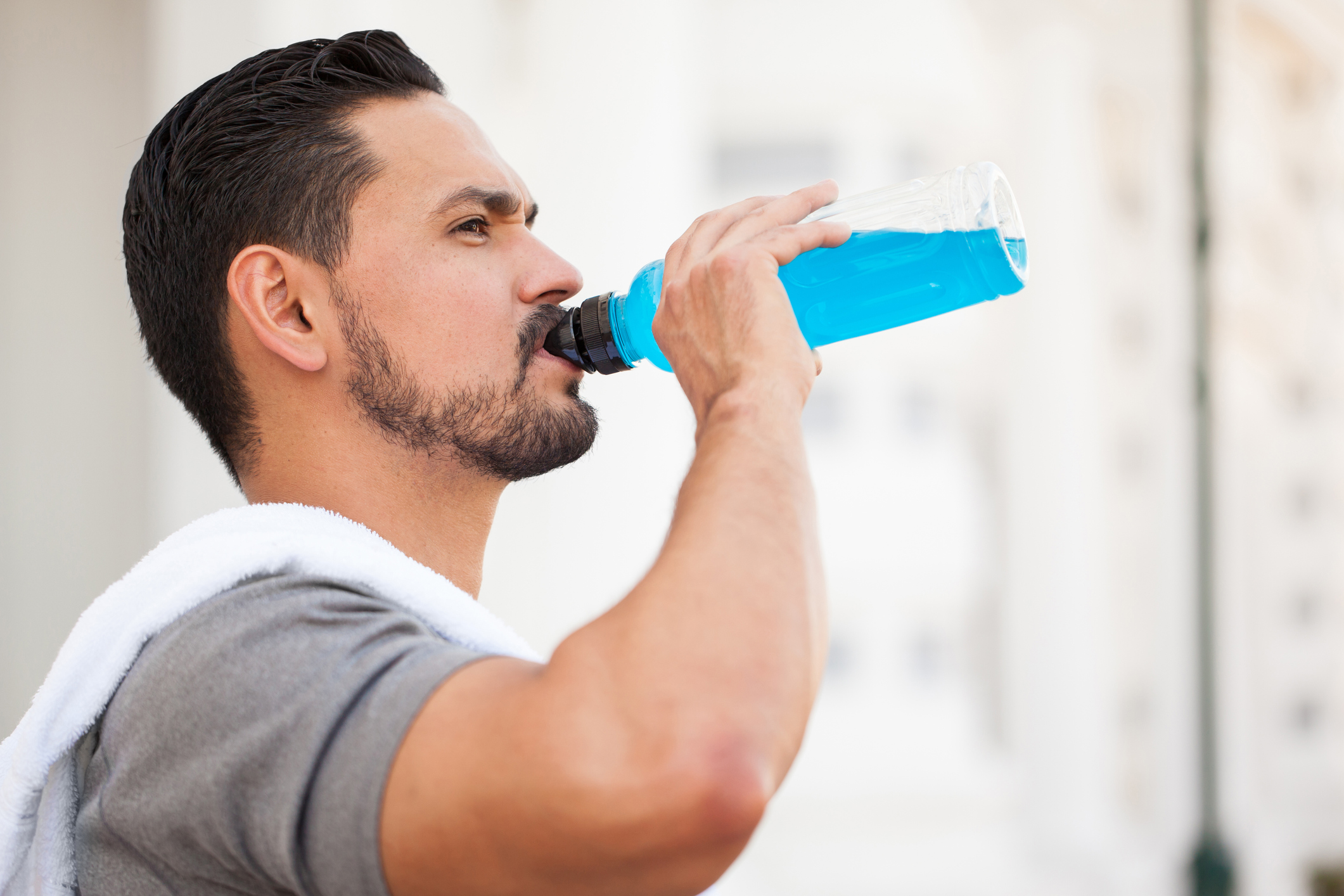
Man drinking sports drink.
A refreshing sports drink might feel like the perfect way to replenish your electrolytes after an intense workout, but have you considered the toll it takes on your oral health? A mounting body of evidence suggests that sports drinks contribute to dental problems, including tooth decay and erosion. Three problematic ingredients found in these beverages include citric acid, sugar, and artificial sweeteners.
The Problems with Citric Acid
Citric acid wreaks havoc on your teeth without your knowledge. As the name suggests, citric acid raises the acidity level in your mouth, compromising the outer layer of your teeth called the enamel. Once the enamel erodes, your teeth become more susceptible to stains and cavities. But that’s not all—citric acid is also known to cause gum inflammation, leading to more serious gum disease if not treated promptly.
The Not-So-Sweet Side of Sugar
Sugar is another common ingredient in sports drinks, which is notoriously linked to dental problems. Unfortunately, sugar feeds the harmful bacteria in your mouth. These bacteria feast on sugar, producing an acidic byproduct that eats away at your enamel. This process leads to cavities and, eventually, rotten teeth.
The Downsides of Artificial Sweeteners
Many sports drink manufacturers claim their products are healthier because they contain artificial sweeteners instead of sugar. While these sweeteners might not directly contribute to tooth decay as sugar does, they can still cause problems. In some people, artificial sweeteners can trigger tooth sensitivities and other dental problems, making them a less-than-ideal choice for good oral health.
Healthier Alternatives to Sports Drinks
Fortunately, quenching your thirst and replenishing your body post-workout doesn’t have to compromise dental health. Consider these viable alternatives:
- Plain water is the best way to hydrate without risking your dental health.
- Coconut water is an excellent natural source of electrolytes, making it a great way to hydrate and refresh without harmful additives.
- Homemade electrolyte drinks are easy to make. Simply mix water with a pinch of salt and a squeeze of lemon for a fast, effective electrolyte drink.
- Iced green tea is packed with antioxidants. Choose the unsweetened variety for a refreshing drink that’s good for your oral health.
- Water sweetened with fruit provides a natural and healthy flavor.
- Carbonated flavored water delivers fizzy satisfaction without added sugar and acid.
- Milk is a surprising source of natural electrolytes. Just avoid flavored or sweetened varieties containing added sugar.
Why Choose Park 56 Dental?
Good dental health requires regular check-ups and cleanings to catch issues early. This is where Park 56 Dental comes in. Our spa-like office caters to a clientele that appreciates personalized, quality dental care. With services ranging from general and cosmetic dentistry to sedation solutions and emergency dental care, we’re prepared to help you smile with confidence. We take pride in treating each patient individually and have been honored with the title of top New York dentist, serving the 10022 zip code since 1997.
Remember, good oral health isn’t just about picking the right drinks—it’s about having the right dental care provider by your side. Contact Park 56 Dental today at (212) 826-2322 for top-notch dental services in NYC.
-
Is Cosmetic Dentistry Right for You?

Happy patient after having cosmetic dentistry services.
It’s no secret that a captivating smile leaves a lasting impression. However, not everyone is born with perfect teeth. Cosmetic dentistry offers a solution for crooked, damaged, or not-so-pearly whites, allowing everyone to enjoy the benefits of an impeccable smile.
Why Do People Seek Out Cosmetic Dentistry?
Cosmetic dentistry provides a path to flawless teeth, improving your appearance and self-esteem. Still, people often seek cosmetic dentistry for more than just aesthetic purposes. By addressing a range of dental issues, cosmetic dentistry can enhance the functionality of your teeth, leading to improved oral health and overall well-being. You may want to seek out cosmetic dentistry if your teeth are:
- Misaligned
- Decayed
- Gapped
- Chipped or cracked
- Small or misshapen
- Stained or discolored
Cosmetic Dentistry Options
Numerous cosmetic dentistry procedures are available, depending on your unique needs:
- In-office Zoom! whitening is a popular option to instantly brighten your smile, effectively tackling discoloration in just three 15-minute applications within one hour.
- Tooth contouring reshapes teeth that don’t look quite right, which is perfect for making minor corrections.
- Bonding is when a tooth-colored material is bonded to a damaged tooth, filling in chips and cracks.
- Veneers are custom-made shells that cover the front of your teeth, perfect for tackling various cosmetic concerns, including gapped, chipped, stained, or misshapen teeth.
- Bridges replace missing teeth, bridging the gap and restoring your smile.
- Implants provide a permanent solution for replacing missing teeth, enhancing functionality and aesthetics.
- Metal-free fillings match your tooth color, fixing decay invisibly for a completely natural look.
- Complete smile makeovers take a comprehensive approach, combining various cosmetic procedures for a total transformation.
What You Should Know
Before embarking on your cosmetic dentistry journey, consider the following:
- Assessment: A thorough dental evaluation is the first step. Your dentist will help you identify the best cosmetic dentistry options for you.
- Timeline: Some procedures require multiple visits or recovery time, so plan accordingly.
- Cost and insurance: Cosmetic dentistry is an investment in your appearance and health, but not all procedures are covered by insurance. Discuss your options with your dentist and insurer.
- Expectations: Cosmetic dentistry can significantly improve your smile, but it’s essential to set realistic expectations.
- Maintenance: Regular check-ups, good oral hygiene, and a healthy lifestyle are recommended to extend the life of your cosmetic dentistry work.
Choosing a Cosmetic Dentist in NYC
Finding the right dental practice to perform your cosmetic procedure is critical to ensuring a pleasant experience and successful outcome. At Park 56 Dental, we know you expect personalized, quality dental care. That’s why we offer a relaxing, spa-like environment right in the heart of New York. We’ve been voted the top dentist in NYC, and with good reason. Specializing in general dentistry, prosthodontics, endodontics, sedation dentistry, and more allows us to focus on treating each patient’s individual needs.
Are you ready to enhance your smile? Contact us at (212) 826-2322 to schedule your cosmetic dentistry assessment. The smile you’ve always dreamed of is within reach!
-
Emergency Dental Care
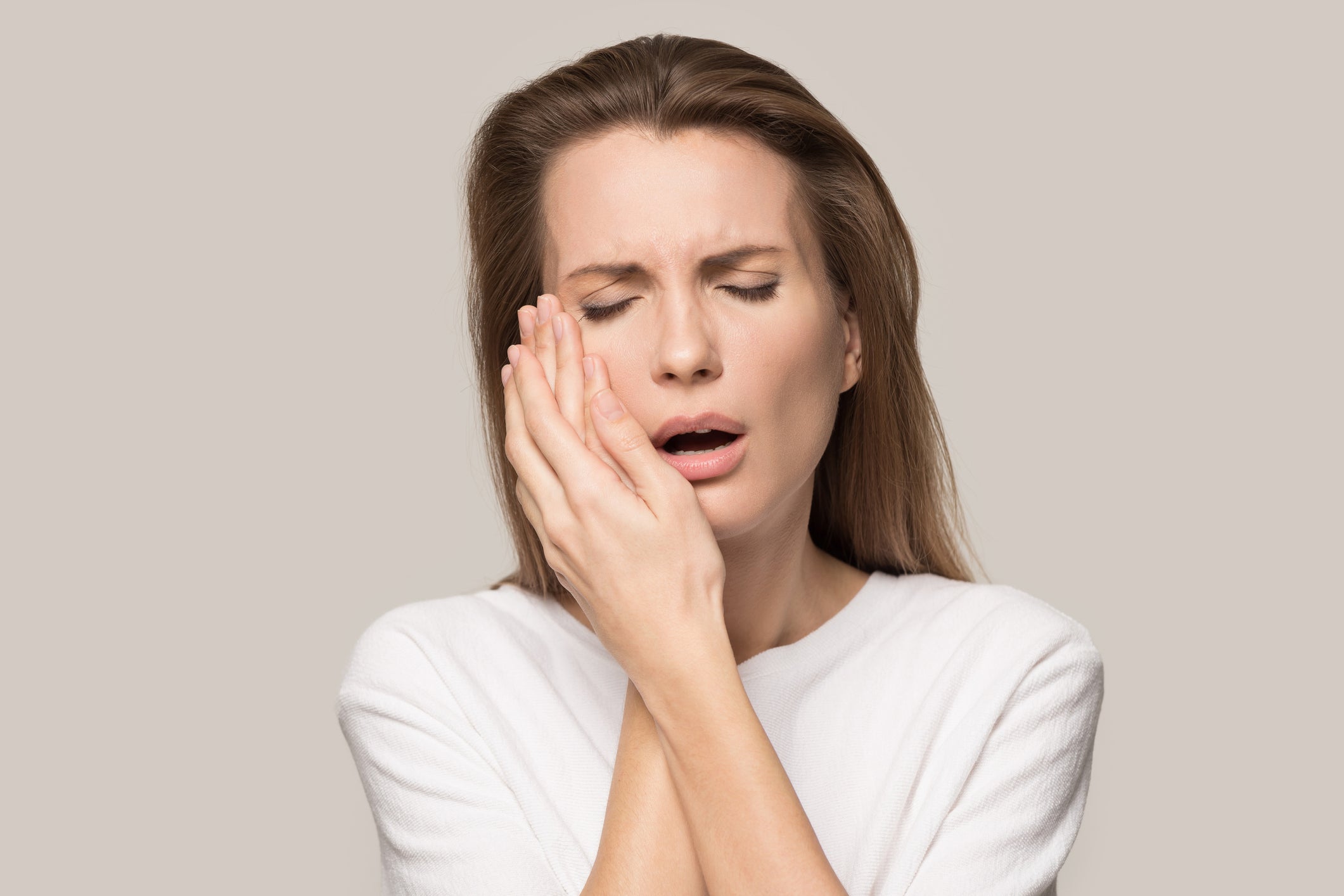
Woman Suffering From Dental Emergency
It’s natural to feel alarmed when you experience a toothache or get hit in the mouth. Is the pain a minor annoyance, or are you about to face a dental emergency? Understanding the difference between urgent and non-urgent dental scenarios helps you act quickly when necessary to maintain your radiant smile.
Deciding If it’s a Dental Emergency
Dental emergencies come in many forms. Some issues require immediate attention to alleviate pain and improve the chances of saving a damaged tooth. Watch for these symptoms of a dental emergency:
- Intense toothache
- Excessive bleeding
- Trauma to the face
- Loose or knocked-out tooth
- Broken or chipped tooth with a large chunk missing
Other issues aren’t a major cause for concern and can wait for a regular appointment. Examples of non-urgent situations include:
- Lost filling or crown
- Cracked tooth without pain or sharp fragments
- Mild toothache with no other symptoms
The Crucial First Response
If you determine you’re having a dental emergency, knowing how to respond is crucial. Follow these tips until you can get to an emergency dentist:
- Treating a toothache: Rinse your mouth with warm water and gently floss to remove trapped food. If the pain persists, take over-the-counter pain relievers. Then, book a dentist appointment to find out what’s wrong.
- Treating excessive bleeding: Rinse with a saltwater solution. Then, apply a clean, damp piece of gauze or a cool, used tea bag to the area. If bleeding continues after 15 to 20 minutes, seek medical help.
- Treating a loose tooth: A loose tooth in adults is not normal. Avoid wiggling it to prevent further damage, and contact your dentist for a professional evaluation.
- Treating a knocked-out tooth: Handle the tooth carefully. Avoid touching the root, rinse it with water if dirty, and try reinserting it into its socket. If that’s not possible, store the tooth in a container of milk or use a tooth preservation kit and go to the dentist immediately.
- Treating a broken, cracked, or chipped tooth: Rinse your mouth with warm water and apply a cold compress. Over-the-counter pain relievers minimize discomfort. Contact your dentist right away, even if there’s no pain, because the tooth may be damaged internally.
The Role of an Emergency Dentist
An emergency dentist handles urgent cases with the proper tools and training. From antibiotics for infections to quick dental procedures for saving a knocked-out tooth, these professionals provide immediate relief and ensure long-term oral health.
Park 56 Dental is your go-to provider for same-day emergency dental care. We have served patients in the 10022 zip code and surrounding areas since 1997. We even boast the title of NYC’s best dentist. Our office feels more like a spa, and we focus on giving personalized, quality dental care to each patient. Our team has experience with everything from general dentistry and sedation dentistry to oral surgery and endodontics.
The next time a dental emergency strikes, you can count on us! Call Park 56 Dental at (212) 826-2322, and we’ll help you get your oral health back on track.
-
Sedation Dentistry
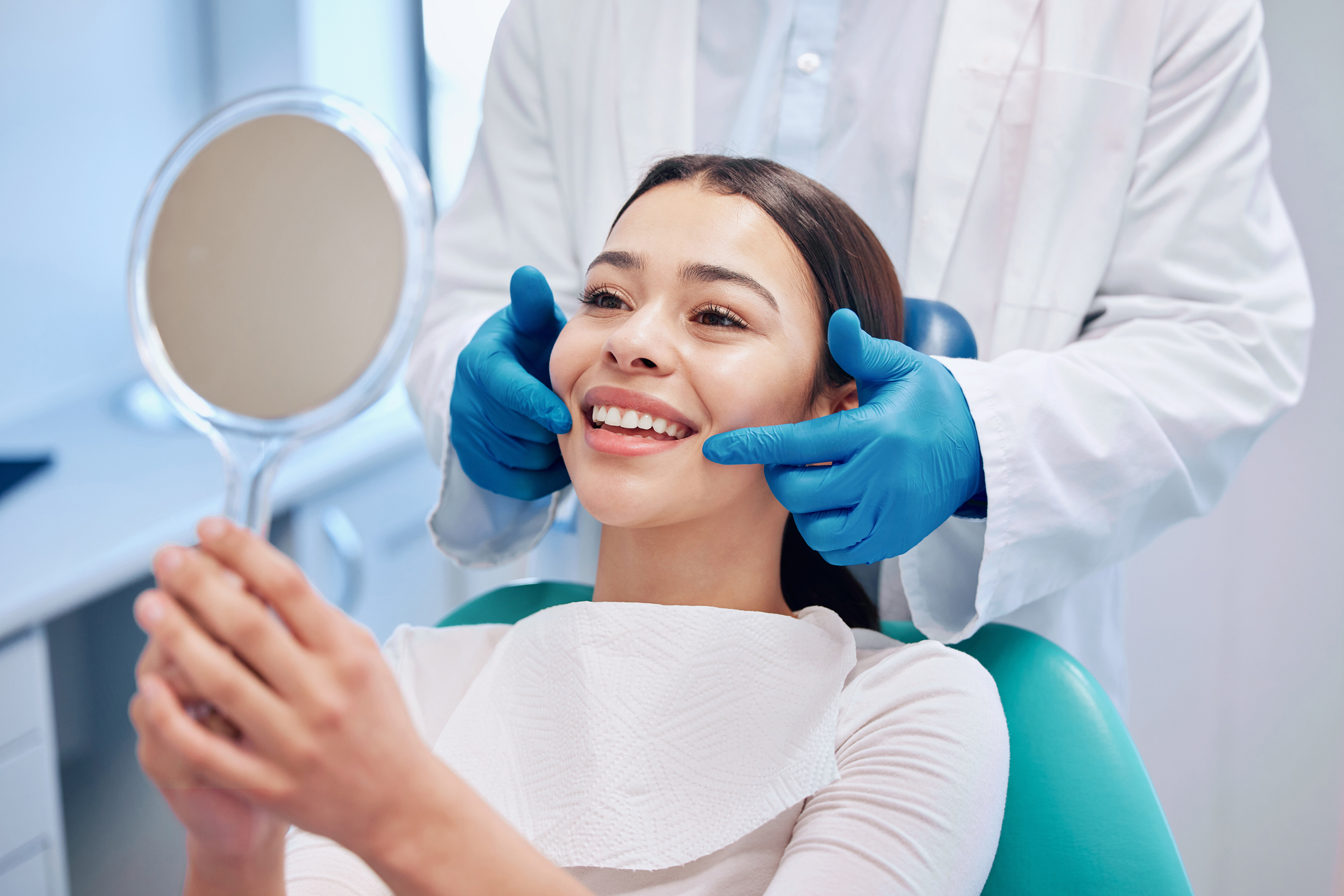
Happy Patient Waking Up From Sedation Dentistry
Does the thought of visiting the dentist make your heart race and your palms sweat? If so, you’re not alone. Dental anxiety affects millions of people, causing them to avoid much-needed dental care. Fortunately, there’s a solution: sedation dentistry. Explore the benefits of sedation dentistry and how it can help you overcome your fears.
What is Sedation Dentistry?
Sedation dentistry involves using medication to help patients relax during dental procedures. It’s especially beneficial for people with dental phobia, sensitive gag reflexes, or low pain tolerance. You may be familiar with some of the sedation techniques used in dentistry, ranging from nitrous oxide (laughing gas) for mild relaxation to intravenous (IV) sedation for achieving deep unconsciousness. The chosen method depends on the patient’s needs and the complexity of the procedure.
Overcoming Dental Anxiety
Feeling anxious about the dentist is a significant barrier to receiving proper oral healthcare. The fear of needles, dental instruments, or the sounds and smells of a dentist’s office can be overwhelming for some. Sedation dentistry makes the experience calming and stress-free, allowing patients to receive needed treatment.
Pain Management
Dental procedures can be extremely uncomfortable for those with a low pain threshold, sensitive teeth and gums, or anesthetic resistance. Sedation dentistry minimizes discomfort during treatment, allowing the dentist to perform procedures more efficiently and with less strain on the patient.
Increased Efficiency for Complex Procedures
Certain dental care, such as wisdom teeth extractions or extensive restorative work, can be time-consuming and require multiple visits. With sedation dentistry, dentists can sometimes complete procedures in fewer appointments because patients are more relaxed and able to tolerate longer treatment sessions. This saves time and effort for both the patient and the dental team.
Gag Reflex Control
Some people have overly sensitive gag reflexes, making dental procedures like taking X-rays and impressions an uncomfortable and challenging affair. Sedation dentistry helps relax the gag reflex, enabling the dentist to perform necessary procedures without triggering discomfort or causing difficulties for the patient.
Improved Communication and Cooperation
Maintaining patient cooperation while receiving dental care is crucial for successful treatment. Patients with dental anxiety or developmental disabilities may struggle to communicate their needs or sit still during appointments. Sedation dentistry reduces anxiety and promotes relaxation to create a more cooperative environment, allowing the dental team to provide the best possible care.
Schedule a Sedation Dentistry Appointment in NYC
Sedation dentistry is a game-changer for anyone who struggles with dental anxiety. Park 56 Dental, located in the 10022 zip code of New York City, provides sedation solutions as part of our comprehensive dental services. We offer a wide range of treatments in addition to sedation dentistry, including general dentistry, smile restoration work, emergency dentistry, and more. Our experienced and caring team takes the time to treat each patient individually, ensuring that all their needs are met.
Don’t let dental anxiety prevent you from achieving optimal oral health. Contact Park 56 Dental today at (212) 826-2322 to schedule a consultation and discover how sedation dentistry can transform your dental experience.
-
The Connection Between Your Dental Health and Vision
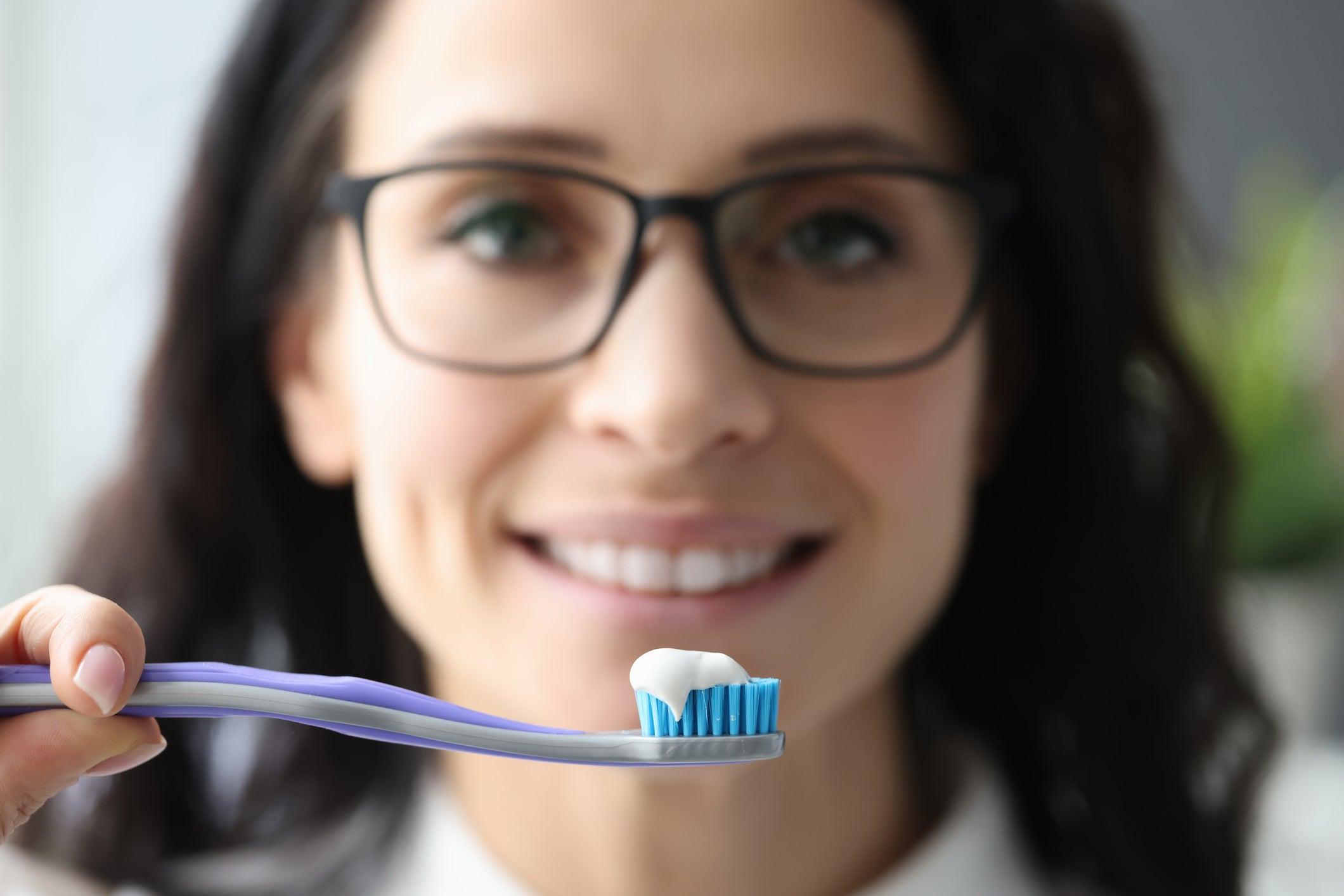
You care for your teeth to keep them healthy and strong, but, as you may know, poor dental health can negatively affect other systems in your body. There is a connection between diabetes and gum disease, for instance, and bacteria from tooth decay can impact your heart health. What you may not realize, though, is that there is a connection between your dental health and your vision. Could caring for your teeth actually protect your vision?
What is the connection between oral health and eye health? According to the American Academy of Ophthalmology, oral infections, including periodontal disease, cause an inflammatory response that can damage the optic nerve and cause vision loss. Additionally, people who have old mercury fillings may be at risk for vision problems that include iritis, color-vision issues, retinitis pigmentosa, and the formation of cataracts.
Poor dental hygiene is also known to contribute to the development of open-angle glaucoma. A degenerative eye disease, open-angle glaucoma results from increased fluid build-up in the eye that places damaging pressure on the optic nerve. Left untreated, this condition can cause vision loss and even blindness. One recent study found that the number of natural teeth a person has, an indication of the person’s dental care, is related to the risk of developing glaucoma.
While seeing an eye doctor is important for keeping your eyes healthy, it seems to be just as important to practice good dental habits. These habits include brushing teeth at least twice a day and flossing at least once, rinsing daily with an anti-bacterial mouthwash, having old fillings replaced with safer materials, and seeing a dentist for gingivitis treatment or a root canal for a badly diseased tooth. Eating a nutrient-dense diet and avoiding unhealthy practices like smoking and using your teeth for things unrelated to chewing food are also healthy habits. It is also a good practice to see a dentist twice a year for preventative cleanings and follow-up exams.
One of the most important factors when it comes to caring for your teeth is finding a good dentist. At Park 56 Dental Group, we offer pediatric, prosthodontics, endodontics, oral surgery, Invisalign®, emergency, and sedation dentistry, all at the highest level of treatment. We serve the Midtown, Central Park, Upper East Side, Park Avenue, and all surrounding Manhattan and New York areas, with a patient-centered practice that has hours to fit your schedule. Schedule your complimentary consultation today by contacting us online or calling us at (212) 826-2322.
-
How to Choose Eco-Friendly Dental Care Products
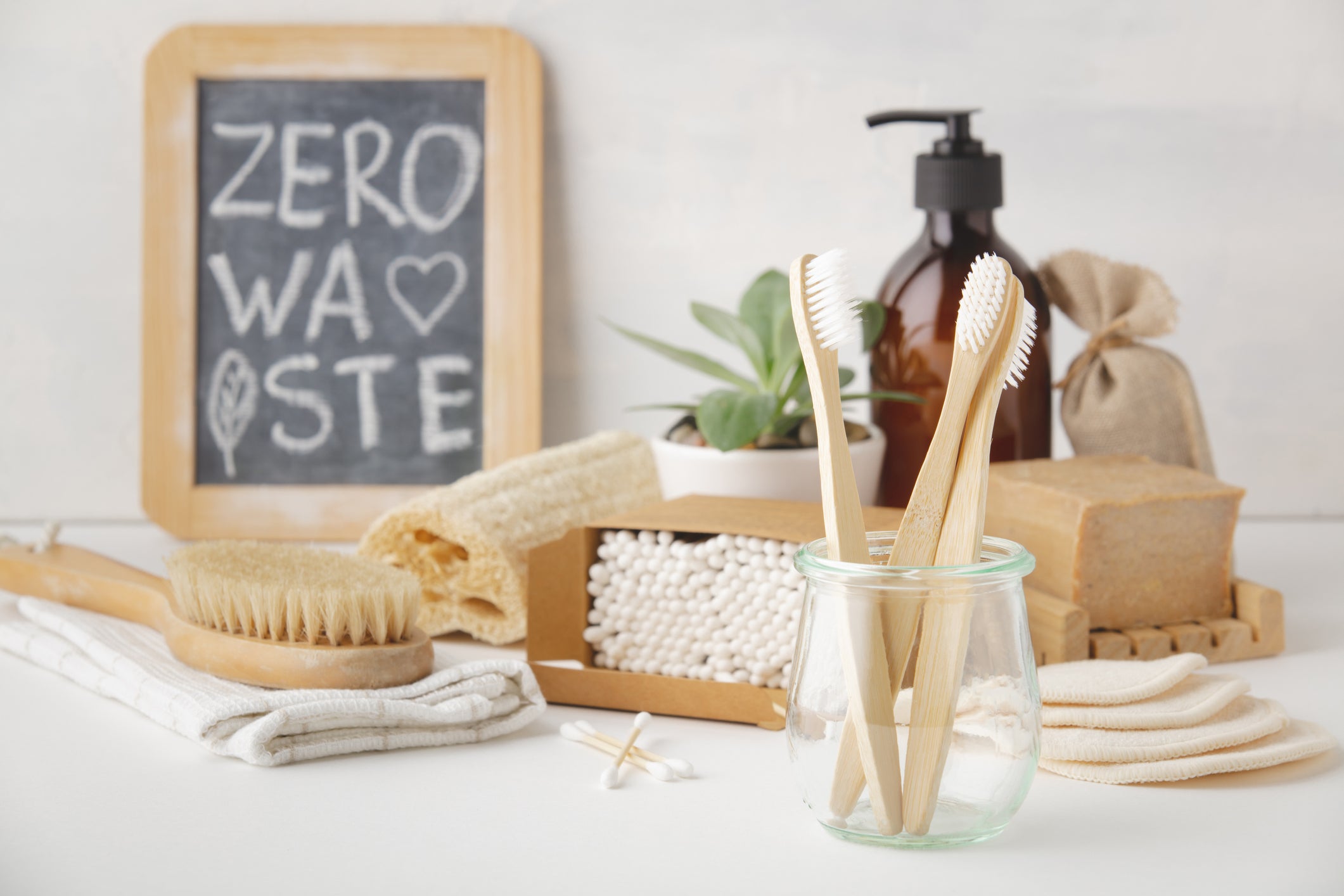
You recycle, use LED lights, carry reusable bags to the grocery store and reusable coffee mugs to the coffee shop, and generally try to keep your carbon footprint to a minimum. You are doing what you can to be eco-conscious, but have you taken a good look at your dental care routine? Choosing eco-friendly dental care products is a great way to minimize your environmental impact, as long as you do it safely. Here, we offer suggestions for creating an eco-friendly dental routine that is also good for your oral health.
- Choose toothbrushes made of sustainable materials. It is important to replace worn out toothbrushes frequently, about every three months, but it is hard seeing those plastic toothbrushes go into the garbage can. Fortunately, there are some sustainable alternatives. One option is to look into recycling programs in your area that take plastic toothbrushes, and another is to repurpose your old toothbrushes, using them to clean things like jewelry, sneakers, kitchen appliances, and bathroom grout. You can also reduce the amount of toothbrush you are throwing away each time by using an electric toothbrush and simply disposing of the heads. Perhaps the simplest thing to do, though, is to use a bamboo toothbrush. Bamboo toothbrushes are renewable, sustainable, and fully biodegradable, making them a very eco-friendly option. To find the perfect bamboo toothbrush, look for one that is BPA free and cruelty free, ethically sourced, and soft-bristled so that you won’t cause tooth erosion when you brush.
- Switch out your toothpaste for an eco-friendly option. Look for a toothpaste that contains fluoride, xylitol, and perhaps calcium phosphate, and check to make sure it has the ADA seal of acceptance. Dry toothpaste, available in tablets or powders, is an excellent option because it requires far less packaging than toothpaste in tubes. Dry toothpaste is highly concentrated and does not contain water. It cleans teeth effectively, is typically sold in sustainable packaging, and is portable and resistant to changes in the weather.
- Toss your floss. Floss is great for your teeth, but most string floss is bad for the environment, because it is not biodegradable. Look for dental floss that does not contain plastic, but is made with natural materials like silk, beeswax, or bamboo, which are all 100 percent biodegradable. You could also invest in a water flosser, which does a good job and produces no waste whatsoever.
- Make your own mouthwash. Many commercial mouthwashes contain alcohol, which can try out your mouth, and come in plastic bottles which may or may not be recyclable. It is easy to make your own mouthwash, however, and you can store it in a reusable glass container. DIY mouthwash is made from ingredients like apple cider vinegar, baking soda, and coconut or peppermint oil. Just be aware that you shouldn’t swallow mouthwash, commercial or homemade.
- Be water wise. Did you know that turning off your tap when you brush your teeth can save up to four gallons of water every time you brush? Fill a cup with water to rinse your mouth and then your brush, and turn off the water while you are brushing.
At Park 56 Dental Group, we offer pediatric, prosthodontics, endodontics, oral surgery, Invisalign®, emergency, and sedation dentistry, all at the highest level of treatment. We serve the Midtown, Central Park, Upper East Side, Park Avenue, and all surrounding Manhattan and New York areas, with a patient-centered practice that has hours to fit your schedule. Schedule your complimentary consultation today by contacting us online or calling us at (212) 826-2322.
-
Does menopause affect your oral health?
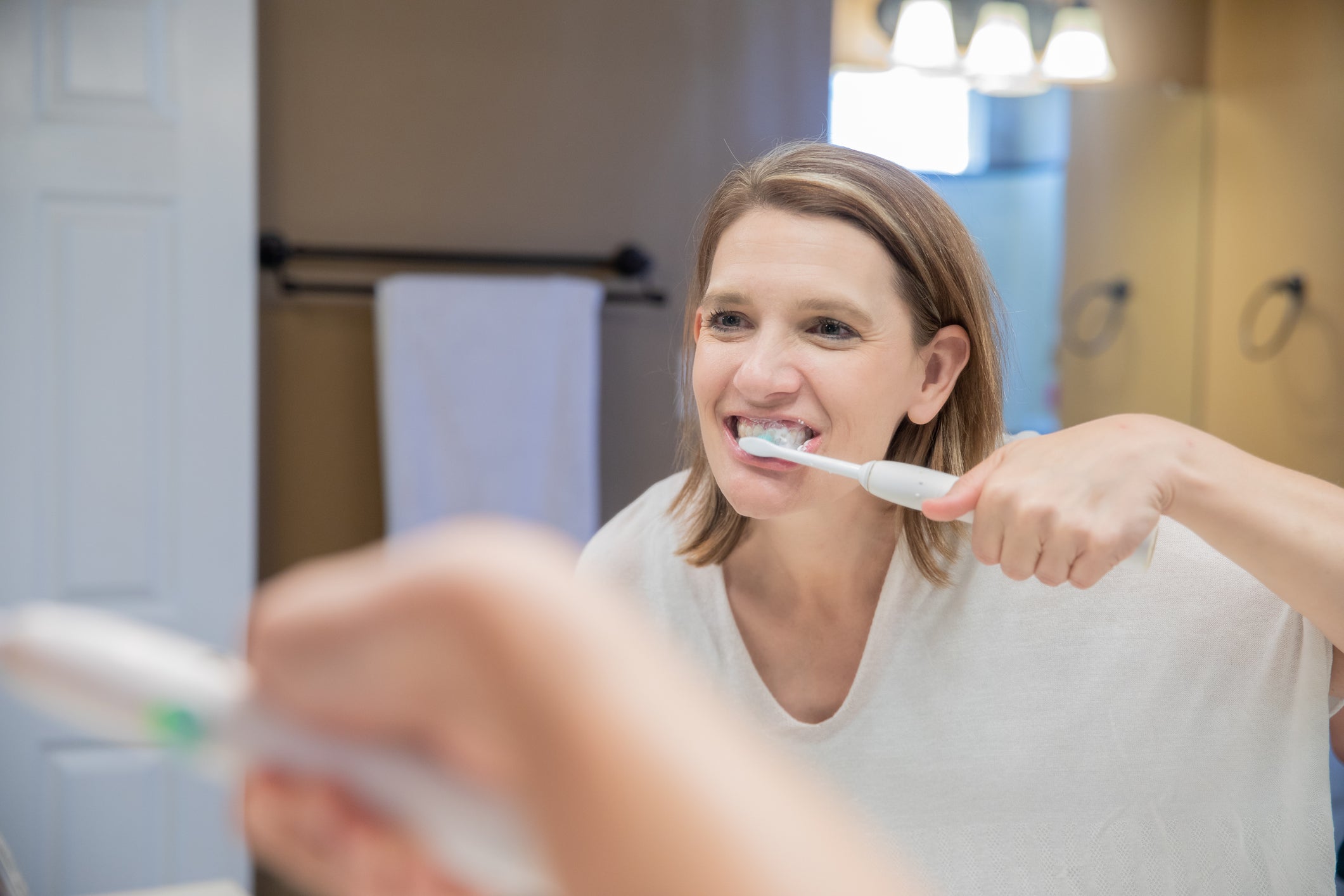
Menopause is a time of life that brings many unpleasant surprises. Hot flashes, insomnia, and mood swings are some of the commonly known symptoms that affect women going through this stage. Less known is the impact of fluctuating hormone levels on the mouth, but there definitely seems to be a link. As estrogen levels decrease during perimenopause and menopause, many women notice sensitive teeth, painful gums, dry mouth, and other issues.
- Hormonal fluctuations can cause tooth sensitivity. If you often find that your teeth hurt after you eat or drink hot or cold things, you may have sensitive teeth. This condition happens when the inner part of the teeth, the dentin, lose their enamel and cementum coatings, leaving the nerves inside vulnerable.
- Gum inflammation is another side effect of menopause. Women going through menopause might experience gingivostomatitis, an oral health condition that causes gum inflammation and canker sores. Periodontal disease can also develop due to low estrogen levels, leading to gum inflammation, bright red or purple gums, gum tenderness and bleeding, receding gums, pus formation, bad breath, bite issues, and loose teeth or gaps between the teeth. Interestingly, another problem that often occurs with menopause is lowered bone density, which can cause bone loss in the jawbone. The treatment for this condition often includes bisphosphonate drugs, which also help prevent the progression, of periodontal disease. Your dentist or periodontist can also treat periodontal disease by scaling to remove tarter, prescribing antimicrobial oral rinses or oral antibiotics, or performing flap surgery. For severe disease, bone or tissue grafts may be necessary. Practicing impeccable oral hygiene is a major part of controlling periodontal disease, and so is quitting smoking.
- Changes in hormone levels can change the way food tastes. Salty, sour, or peppery foods bother some women, and food can sometimes taste unusually bitter or metallic. Sometimes, these menopause-related taste changes are accompanied by a condition known as burning mouth. As the name implies, burning mouth causes burning, pain, and tenderness around the mouth, including the lips tongue, and cheeks.
- Tooth pain can be caused by menopausal changes. For example, declining estrogen levels can decrease the thickness of the oral mucosal epithelium, leading to greater sensitivity to pain and higher vulnerability to mouth infections.
- Dropping hormones can cause dry mouth. Hormones help support saliva production and maintain the consistency of the saliva, but lower levels of estrogen can decrease your mouth’s ability to produce saliva. Dry mouth makes it uncomfortable to eat, but it can also cause gum sensitivity, mouth ulcers, sore gums, an increase in infections, and cavities.
Often, doctors prescribe hormone replacement therapy to help combat the signs of menopause. However, it’s also important to work with your dentist to keep your oral health in good shape. Regular cleanings and check-ups, brushing and flossing daily, taking supplements like calcium and vitamin D, and using products to treat sensitive teeth and dry mouth can all be part of maintaining oral health during menopause. It’s also important to have a good dentist.
At Park 56 Dental Group, we offer pediatric, prosthodontics, endodontics, oral surgery, Invisalign®, emergency, and sedation dentistry, all at the highest level of treatment. We serve the Midtown, Central Park, Upper East Side, Park Avenue, and all surrounding Manhattan and New York areas, with a patient-centered practice that has hours to fit your schedule. Schedule your complimentary consultation today by contacting us online or calling us at (212) 826-2322.
-
How Staying Hydrated Can Help Improve Your Dental Health
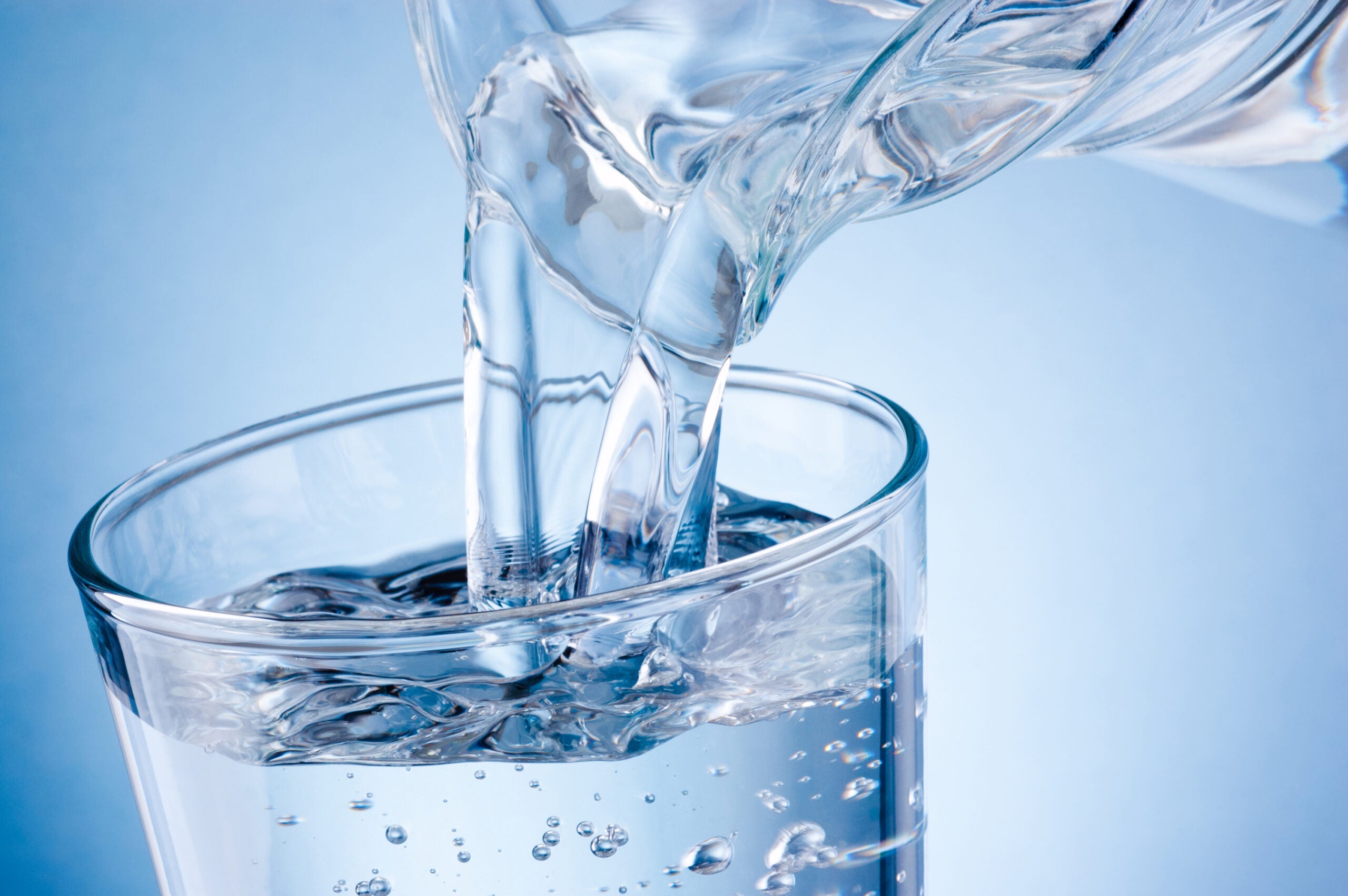
You hear it from everyone: drink more water. Experts advise drinking about eight glasses of water each day to help improve your health. Water is good for you for many reasons; it helps you detox, keeps your skin plump, youthful, and clear, and may even reduce your risk of certain cancers. It helps just about every system in the body, from your circulation to your muscles, and it’s no wonder, because we’re made of about 60 percent water. What you may not know, though, is that in addition to all those benefits, remaining well hydrated can improve your dental health. Let’s take a closer look at why that’s true.
- Water strengthens teeth. Water, especially fluoridated water, contains fluoride and other minerals that help restore the calcium and phosphorous levels in dental enamel. Did you know that in communities with fluoridated water, each dollar spent on fluoridation saves about $38 in dental healthcare costs? Drinking water is especially important for young children because it strengthens teeth as they are forming, making them more cavity-resistant throughout the child’s life.
- Drinking water helps clean the mouth. Drinking sugary beverages like soda, sports drinks, and juice can cause sugars to remain on the surface of the teeth. This leads to growth of the bacteria in plaque, which release harmful acids that degrade tooth enamel and cause decay. Drinking water, on the other hand, washes away food residue and discourages bacterial growth. Because food residue and bacteria cause bad breath, people who drink a lot of water have better smelling breath. Drinking water isn’t a substitute for brushing and flossing, but it can be an important part of your dental care routine.
- Dry mouth can be alleviated by drinking water. This makes sense, because saliva is 99 percent water. Dry mouth is a condition in which the mouth does not produce enough saliva, making it harder to chew and swallow, and causing an elevated risk of tooth decay. Drinking water hydrates the mouth and stimulates saliva production, making it a powerful weapon against dry mouth.
- Water can help prevent stains on the teeth. Foods and beverages like coffee, tomato sauce, wine, curry, and citrus fruits can leave behind stains, but drinking water in between bites or sips can quickly rinse away residue before it has the chance to settle into a stain.
- Water is a calorie free beverage. Consumption of sugary beverages contributes to the rising obesity rate in the United States, and people who drink more than one sugary beverage per day are nearly 30 percent more likely to develop type 2 diabetes. Water has no calories and no sugar, making it a much healthier option.
At Park 56 Dental Group, we offer pediatric, prosthodontics, endodontics, oral surgery, Invisalign®, emergency, and sedation dentistry, all at the highest level of treatment. We serve the Midtown, Central Park, Upper East Side, Park Avenue, and all surrounding Manhattan and New York areas, with a patient-centered practice that has hours to fit your schedule. Schedule your complimentary consultation today by contacting us online or calling us at (212) 826-2322.
RECENT POSTS
categories
- Uncategorized
- Cosmetic Dentistry
- Veneers
- Healthier Teeth
- Teeth Whitening
- Dental Health
- Video
- Dental Emergencies
- Invisalign
- Dental Implants
- Root Canal
- Sedation Dentistry
- Infographic
- Dental Crowns and Bridges
- Dental Anxiety
- Gum Disease
- COVID-19
- Bad Breath
- New York Dentist
- Cut out sugar
- General Dentistry
- Oral Health
- Oral Cancer
- Dry Mouth
- Gum Health
- Toothache
